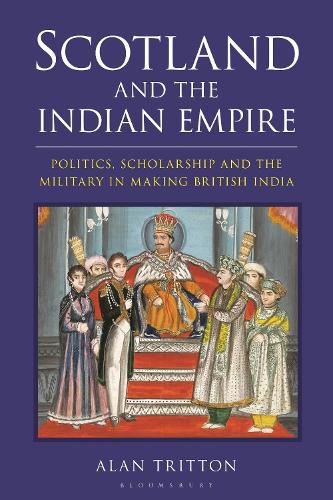
Scotland and the Indian Empire: Politics, Scholarship and the Military in Making British India
(Hardback)
Publishing Details
Scotland and the Indian Empire: Politics, Scholarship and the Military in Making British India
By (Author) Alan Tritton
Bloomsbury Publishing PLC
Bloomsbury Academic
12th December 2019
United Kingdom
Classifications
Professional and Scholarly
Non Fiction
954.030922
Physical Properties
Hardback
232
Width 160mm, Height 236mm, Spine 26mm
520g
Description
This is the story of two Scotsmen, Baillie and Edmonstone, who went out to India in 1782 and 1791 respectively, to earn their fortune. Neil Edmonstone rose through the ranks to be appointed the Acting Governor-General of India, Secretary of the Secret, Foreign and Political Department and for more than 20 years the Chief Intelligence Officer of the Company. John Baillie was appointed the Political Agent, aged 30, for Bundelkhand, which he brought successfully under British control, before his appointment as British Resident at Lucknow in 1807. Both men had no less than 21 Anglo-Scottish and Scottish-Indian children, 9 of whom were all sent back to Inverness in Scotland to be educated and brought up by Johns sister Margaret Baillie. This book tells us their stories as well as those of their parents.
Author Bio
Alan Tritton was born in 1931 and educated at Eton College. In 1950-52 he was on active service in the Far East as a Commissioned Officer with his Regiment the Seaforth Highlanders, where he was severely wounded in action. In 1954, following a previous sub-Arctic expedition in 1949, he was appointed Station Leader of the South Orkneys Antarctic Station of the then Falkland Island Dependencies Survey - now the British Antarctic Survey - later on he was elected President of the Antarctic Club. He participated in a number of Polar and Himalayan expeditions including the British Trans-Arctic Expedition and the British Everest South West Face expedition in 1975. He was elected a Vice-President of the Royal Geographical Society and later on a member of the Council of the Royal Asiatic Society. Prior to that he established the Calcutta Tercentenary Trust, which restored and conserved the British and European heritage paintings in the possession of the Victoria Memorial Hall, Calcutta and was the President of the British Association of Cemeteries in South Asia. For his work in India, he was awarded the C.B.E. in 1999.
